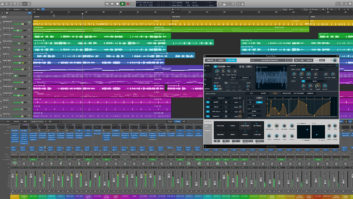Is the market for music software saturated? Although these tools are always attracting new users, the adoption numbers just aren’t growing like they used to. And many who have the software already don’t use it to its fullest potential. It’s becoming common for users to wait to install software updates until several have accumulated, partly to avoid disruption to an existing workflow and partly because of a sense that it’s worth waiting until there are a significant number of changes to explore.
I don’t believe this shift means music software publishers are doomed. We already have a model of where the industry may be going. Consider Apple, which revolutionized the smartphone market with the iPhone in 2007; iPhone sales peaked around 2015 and unit sales have decreased in the years since. Once everyone has an iPhone, you’re not going to sell as many iPhones. Or look at Microsoft: Its operating system is installed on over 87 percent of the world’s desktop computers, according to Net Marketshare, so doubling sales is impossible—unless we discover creatures on other planets who need operating systems.
We can see that both companies added services offerings to mitigate sluggish sales in their core product lines. For Apple, that’s Apple Music, Apple Pay, iCloud, Apple Care and, coming soon, Apple TV+, Apple Arcade and an Apple-branded credit card. For Microsoft, it’s services like Azure (which now offers individual servers to users), OneDrive, Microsoft Teams, Surface Hub 2S (an interactive whiteboard for business) and the like. Even Amazon, which started out as an online bookseller, has diversified into Amazon Prime movie and television streaming, web hosting, and independent ebook publishing services.
Related: Software Tech: Can Pro Audio Software Sustain?, by Craig Anderton, May 24, 2018
What would a services component look like for pro audio software? There are already some examples, like Avid’s Media Composer, AvidPlay (a service by which users distribute their music to common streaming platforms), product training from Avid Link and the like. Native Instruments created Sounds.com, a service that provides content for software beyond what NI makes. Another good example is Obedia, which did the reverse, extending its core service business (support that’s not tied to a particular manufacturer) by adding a hardware component with the PC Audio Labs computer line.
The following list suggests other directions pro audio software companies could take.
Automated, Incremental Cloud Backup
I’d pay for a service that would automatically—and, most important, incrementally—back up selected projects-in-progress to the cloud. This process would protect against hardware failures, provide easy collaboration and offer a way to work on projects remotely. Although you can always back up using Google Drive or the like, that save isn’t incremental—if you have a 4 GB project, you have to deal with a 4 GB chunk of data. The way Microsoft has configured OneDrive and Office, you can load documents directly from OneDrive, and changes occur while you write. Similarly, once something like a drum track is finalized, you don’t need to keep backing it up.
Publishing and Training
A company’s tech support crew often receives requests that go beyond support’s traditional purview, with questions like, “How do I get a good reverb sound on piano?” Although there are online resources for this kind of education, they often relate to a specific piece of software—and if you don’t use that software, it won’t help much. PreSonus experimented with a new approach to training by releasing two ebooks I wrote about how to record vocals in Studio One, and how to use Studio One’s dynamics processors. The books have done well enough to convince me that there’s a market for “localized” books keyed to specific programs that are more about how to apply a program than how to use a program (the traditional manual). Perhaps it’s just a matter of time before manufacturers create publishing divisions to do everything from applications-oriented ebooks to teacher’s guides for schools.
Want more stories like this? Subscribe to our newsletter and get it delivered right to your inbox.
Computer Support
I’d pay $9.99 a month to schedule a monthly session with an IT pro to check and maintain my computer’s health. Although a company like Obedia already offers this service, some aspects of computer health are unique to specific software programs. For example, outdated drivers can cause conflicts with some audio programs but not others. A company that has identified these potential problems could update the driver or ask if you want it removed. It could also initiate disk scans, run SMART tests to check hard drive reliability, remove leftover Windows registry entries from previous versions, ask if you want to disable performance-robbing features or unneeded background programs, make sure you haven’t missed program updates and the like.
These are a few examples of how music software companies could explore additional revenue streams, while providing real-world benefits. With some companies already taking this path, it will likely become more widespread.







